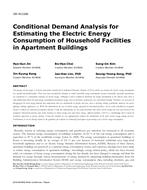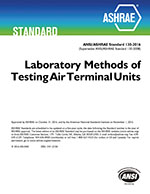Click here to purchase
HVAC equipment manufacturers spend a considerable amount of time and effort updating existing product lines in order to meet ever-increasing performance standards. Traditional approaches consisting of several prototype iterations being built and experimentally tested are time consuming and costly. Through advancements in computer technologies within the last decade, computational fluid dynamics (CFD) has become an economical solution allowing HVAC equipment designers to numerically model prototypes and reduce the time required to optimize a given design and identify any potential failures points. Airflow uniformity is considered an important consideration for air handling unit (AHU) manufacturers as it affects the performance of the overall system. Plenum fans inherently produce a rotational airflow pattern, which, if not mitigated appropriately, can create a highly, non-uniform airflow that enters a heat exchanger located downstream. This can lead to lower heat transfer rates and premature heat exchanger failure. While CFD offers the ability to visualize and characterize the airflow through an AHU system, it is often used to solely model individual components such as fans or heat exchangers without analyzing it in a real world situation. This paper presents the CFD models used to characterize the airflow uniformity within an AHU in order to aid in understanding heat exchanger performance.
Citation: 2016 Winter Conference, Orlando, FL, Conference Papers
Product Details
- Published:
- 2016
- Number of Pages:
- 8
- Units of Measure:
- Dual
- File Size:
- 1 file , 1.7 MB
- Product Code(s):
- D-OR-16-C070


